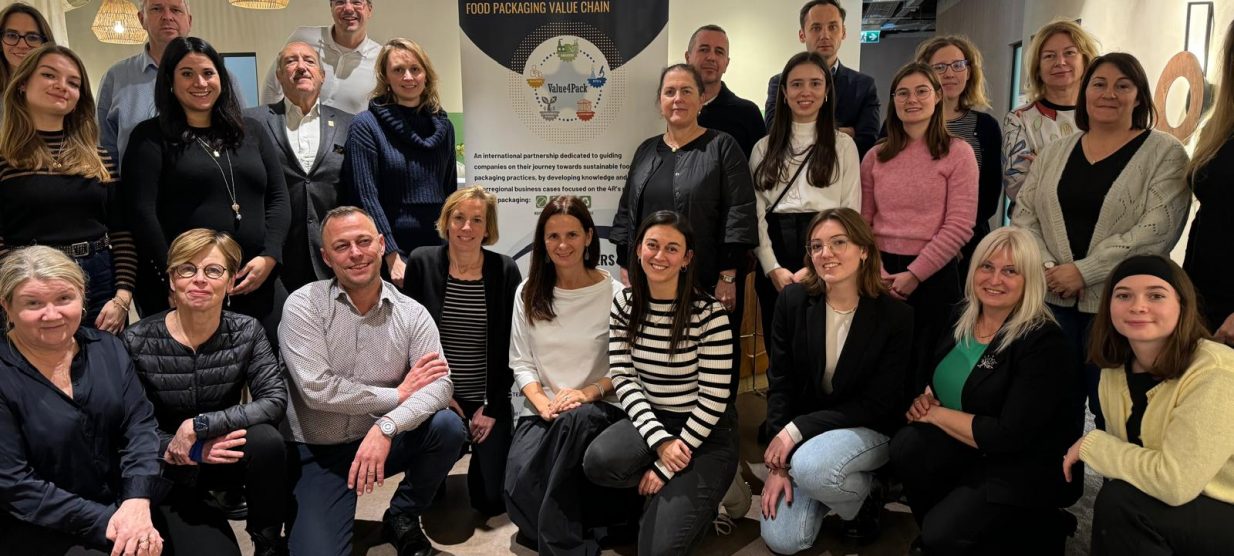Sustainable Food Packaging in Hungary: Challenges and Opportunities
The future of the packaging industry is increasingly shaped by sustainability and innovation. At its recent workshop, the OMNIPACK First Packaging Technology Cluster brought together key stakeholders in the Hungarian food packaging sector to explore how the industry can transition to greener, more economically viable solutions.
EU 2030 Goals in Focus
The European Union has set a target that by 2030, all food packaging should be recyclable in an economically sustainable way. Supporting this goal, the Value4Pack project, with OMNIPACK representing the Hungarian packaging sector, aims to foster innovation and strengthen collaboration between developed and less developed regions within Europe.
Key Challenges in Sustainable Packaging
Workshop participants identified several critical obstacles to the advancement of sustainable packaging:
- Regulatory Barriers: Current legislation complicates the introduction of sustainable solutions like biodegradable or recyclable materials. The existing framework places financial burdens on producers and fails to differentiate between environmentally friendly and conventional materials.
- Technology and Market Limitations: While Hungary has promising startups, innovation often struggles to move from development to market due to a lack of investment.
- Consumer Behavior: Price sensitivity and the demand for convenience continue to outweigh environmental considerations for many consumers.
- International Competition: Imported low-cost packaging materials create stiff competition for local sustainable alternatives.
- Infrastructure Gaps: There is insufficient capacity to meet the growing demand for sustainable packaging and recycling solutions.
Emerging Opportunities
Despite the challenges, several promising opportunities were highlighted:
- Digital Tools for Traceability: Technologies like QR codes and AI can enhance transparency around packaging materials and recycling instructions, helping both consumers and authorities.
- EU Funding and Policy Support: EU directives and funding programs can accelerate the development and adoption of sustainable packaging technologies.
- Growing Consumer Awareness: More people are seeking eco-friendly options. Companies that effectively communicate their sustainability efforts can gain a competitive edge.
- International Collaboration: Learning from best practices and partnering with international players can strengthen local solutions and accelerate progress.
Implementation Phase: Turning Strategy into Action
To move from ideas to action, OMNIPACK is facilitating a series of professional events that foster collaboration and practical implementation across the value chain.
1. Value4Pack Professional Workshop
📅 Date: February 15, 2024
📍 Location: H2O Office Building, Budapest
This professional event was held under the Value4Pack project, which is part of the Horizon Europe Interregional Innovation Investment Instrument (I3). The project is the first of its kind involving Hungarian participation in a winning consortium, which also includes partners from Poland, Belgium, France, Spain, Italy, Slovenia, Latvia, Lithuania, Finland, and Sweden. OMNIPACK represents Hungary in this diverse and innovative network.
The workshop brought together industry players, research institutions, and government representatives to identify regional strengths and competencies at various phases of the packaging value chain. The goal was to foster a flexible and sustainable value chain aligned with the ambitious goals of the EU Green Deal for food packaging.
2. Value4Pack Pitching Event
📅 Date: November 26, 2024
📍 Location: H2O Office Building, Budapest
On 26th November 2024 an inspiring pitching event was organised in Budapest where 30 innovative cooperation proposals were presented by forward-thinking organizations. These proposals showcased creative solutions – aligned with the 4R’s – to drive the future of sustainable food packaging in the EU.
Following the pitching event all cooperation proposals presented will be thorougly examined and supported, helping them connect with the ideal partners across Europe to bring their ideas to life.
Strategies for a Greener Transition
The white paper outlines concrete strategic recommendations for advancing sustainability in packaging:
- Implement Digital Solutions: Use digital tracking systems (e.g., QR codes) to inform consumers about recyclability and compostability.
- Maximize EU Funding: Support companies in applying for EU grants and organizing workshops to promote awareness.
- Boost Consumer Education: Run campaigns that raise awareness, especially among younger generations, about the benefits of sustainable packaging.
- Introduce Green Tax Policies: Offer tax incentives for sustainable packaging and impose higher taxes on non-sustainable options.
- Create Targeted Support Programs: Launch national grants that specifically fund research and the market entry of sustainable innovations.
- Revise Regulatory Frameworks: Clarify definitions around compostability and recyclability, and update waste management practices.
- Align National and EU Regulations: Ensure Hungarian legislation aligns with EU sustainability goals, especially around circular economy principles.
- Support R&D: Encourage innovation and cross-sector collaborations to fast-track the development of new sustainable solutions.
- Leverage International Experience: Adopt proven international packaging models and apply them within the local context.
- Invest in Education and Training: Develop professional training programs to prepare the next generation of packaging experts.
- Expand Recycling Infrastructure: Focus on boosting recycling capabilities, especially in chemical recycling technologies.
A Shared Path Toward a Sustainable Future
The insights from the OMNIPACK workshop make it clear: the path to a sustainable packaging industry lies at the intersection of innovation, environmental responsibility, and consumer engagement.
Through collaboration among industry players, policymakers, researchers, and consumers, Hungary can take a leading role in the green transition. While the challenges are significant, so are the opportunities—to build a packaging sector that serves both present needs and future generations.
OMNIPACK First Packaging Technology Cluster is committed to continuing this dialogue and driving change. With joint efforts and shared responsibility, we can shape a future where sustainability is the standard, not the exception.

Do not hesitate to contact us
Get in touch, if you have any question


